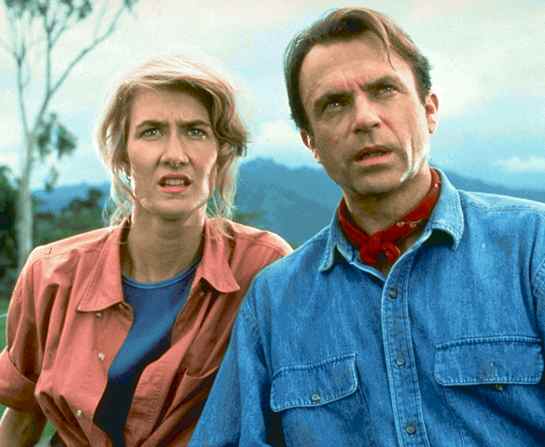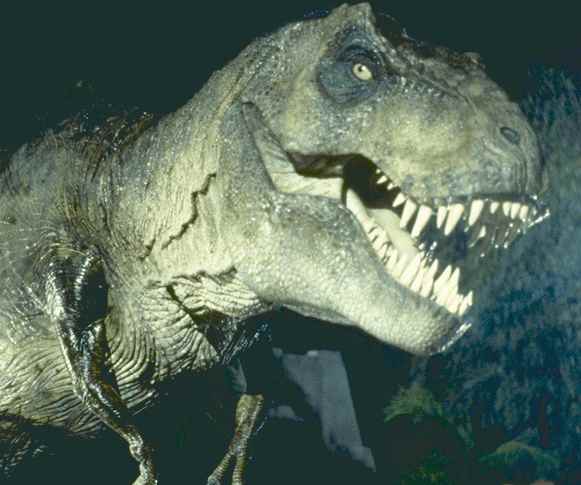

Director: Steven Spielberg, 1993. (PG-13)
Almost two decades on, Jurassic Park is still a thrill. Having given the world Jaws and Indiana Jones, and before he directed Schindler's List, Spielberg directed Michael Crichton's screenplay (from his own book). The best of the trilogy of these dinosaur films, this movie was one of the first to use CGI on a large scale, and it needed to be to capture the "hero" of the film: Tyrannosaurus Rex. As we look today at films that mix computer generated imagery with reality like Avatar, it is hard to remember when CGI was a novelty and in its fantasy. Here it is used successfully and earned worthy Oscars for sound and visual effects.
The story is simple. Millionaire entrepreneur
 John Hammond (Richard Attenborough) has created a new theme park, Jurassic Park. A Disney Land-type environment, the exhibits are not mechanical rides but living creatures: dinosaurs. Using genetic technology and dino DNA extracted from insects encased in amber, he has brought these giants back to life as a capitalist venture. But an accident has the investors worried. And he needs testimonials from a pair of independent scientists to keep his project on track. Dr. Grant (Sam Neill) is the paleontologist; his girlfirend, Dr. Sattler (Laura Dern) is the paleobotanist. Dr. Malcolm (Jeff Goldblum), the mathetician and chaos theorist, is thrown in as the wild card (and Hammond's conscience).
John Hammond (Richard Attenborough) has created a new theme park, Jurassic Park. A Disney Land-type environment, the exhibits are not mechanical rides but living creatures: dinosaurs. Using genetic technology and dino DNA extracted from insects encased in amber, he has brought these giants back to life as a capitalist venture. But an accident has the investors worried. And he needs testimonials from a pair of independent scientists to keep his project on track. Dr. Grant (Sam Neill) is the paleontologist; his girlfirend, Dr. Sattler (Laura Dern) is the paleobotanist. Dr. Malcolm (Jeff Goldblum), the mathetician and chaos theorist, is thrown in as the wild card (and Hammond's conscience). When Hammond brings these scientists to his remote tropical island, their initial reaction, upon seeing herds of dinosaurs roaming free, is spectacular. And it is not unlike our own reaction the first time we see these creatures, especially if it is on the big screen. Unbelievable! (I had a similar reaction when seeing the 3D creatures in Avatar recently.) The objects of their lives' work digging up bones are running just feet away from them.
When Hammond brings these scientists to his remote tropical island, their initial reaction, upon seeing herds of dinosaurs roaming free, is spectacular. And it is not unlike our own reaction the first time we see these creatures, especially if it is on the big screen. Unbelievable! (I had a similar reaction when seeing the 3D creatures in Avatar recently.) The objects of their lives' work digging up bones are running just feet away from them.What makes Jurassic Park so good is its pacing. Spielberg tempts us with the bait of dinosaurs, and especially T-Rex, but we have to wait almost half the film to see the monster. He allows the characters time, like us, to marvel at the theme park idea. But he amps up the suspense with a tropical storm and a mercenary geek.
 The story moves into high gear when the nerd computer scientist turns off the electricity and the security systems, allowing the dinosaurs to escape their paddocks. With this comes the first sighting of T-Rex, and the famous jeep chase. Added to that are the velociraptors, smaller but more cunning than Rex. These beasts hunt in packs, run like cheetahs, and can even open doors. The third act, where Hammond's two grandchildren are trapped in the kitchen with two raptors hunting them, is as intense and suspenseful as any recent movie.
The story moves into high gear when the nerd computer scientist turns off the electricity and the security systems, allowing the dinosaurs to escape their paddocks. With this comes the first sighting of T-Rex, and the famous jeep chase. Added to that are the velociraptors, smaller but more cunning than Rex. These beasts hunt in packs, run like cheetahs, and can even open doors. The third act, where Hammond's two grandchildren are trapped in the kitchen with two raptors hunting them, is as intense and suspenseful as any recent movie.But Jurassic Park is more than just escapist nonsense. Within this exciting thriller, Spielberg explores man's intrusion into, and commercialization (even destruction) of, nature. Malcolm is the foil who embodies all the social messages of this movie. With a quick wit and a sharp tongue, he gives the film its memorable quotes.
Early on, Malcolm offers the observation, "The lack of humility before nature that's being displayed here, uh . . . staggers me." He goes on, "If there is one thing that the history of evolution has taught us it's that life will not be contained. Life breaks free, expands to new territory, and crashes through barriers, painfully, maybe even dangerously."
The so-called "cultural mandate," given in Genesis 1 to mankind to "be fruitful and increase in number; fill the earth and subdue it" (Gen. 1:28) is often seen as a mandate to harness the natural world. More likely, it is a mission to care for the world of nature. Unlike Hammond, we don't have free rein to create whatever we want for our own personal profit. Hammond's motivation was the almighty dollar. He even created the knick-knacks to market with his park. But the world of nature is one that is wild and dangerous. We must be wary of trying to tame it, especially if it is just for cash. It warrants our respect. If that is missing we stand to lose more than our money, as some in this film find out.
 Though the movie is clearly evolution-centric, Malcolm quips, "God creates dinosaurs. God destroys dinosaurs. Man destroys God. Man creates dinosaurs. . . " Regardless of the type of evolution in mind, micro or macro, God is still the Creator. Malcolm has it right. God creates (Gen. 1:1). He made all creatures. But Malcolm is wrong on God's destruction. Man has not and cannot destroy God. God is above mankind. If we could destroy him he would not be God! Although man has tried to replace God, the creature cannot obsolete the Creator, as Hammond eventually finds out to his chagrin.
Though the movie is clearly evolution-centric, Malcolm quips, "God creates dinosaurs. God destroys dinosaurs. Man destroys God. Man creates dinosaurs. . . " Regardless of the type of evolution in mind, micro or macro, God is still the Creator. Malcolm has it right. God creates (Gen. 1:1). He made all creatures. But Malcolm is wrong on God's destruction. Man has not and cannot destroy God. God is above mankind. If we could destroy him he would not be God! Although man has tried to replace God, the creature cannot obsolete the Creator, as Hammond eventually finds out to his chagrin.Malcolm brings up the ethics of technology: "Yeah, but your scientists were so preoccupied with whether or not they could, they didn't stop to think if they should." Ethics forces us to ask the "should" questions. Just because we can do something does not make it right. This could be translated into modern bio-ethics. For example, just because we can do stem cell research does not necessarily mean we should. Such questions deserve lengthy discussion and debate. And the answers should not be driven by capitalism. Morality must stand above simple profit and loss statements. It is ironic that it was technology that enabled the creation of these dinosaurs for this movie, and it is technology that comes under its attack.
There is a root problem inherent within Jurassic Park's creators. Malcolm sums it up:
I'll tell you the problem with the scientific power that you're using here: it didn't require any discipline to attain it. You read what others had done and you took the next step. You didn't earn the knowledge for yourselves, so you don't take any responsibility. . . for it. You stood on the shoulders of geniuses to accomplish something as fast as you could and before you even knew what you had you patented it and packaged it and slapped it on a plastic lunchbox, and now . . . you're selling it.Hard work researching and refining something can force us to evaluate the value of our result. But when we simply rip off someone else's ideas or work, we have no context for this. We lose the sense of responsibilty. And there is implicit danger and risk in this: "Don't you see the danger, John, inherent in what you're doing here? Genetic power is the most awesome force the planet's ever witnessed, yet you wield it like a kid that's found his dad's gun." Until and unless we understand the gravity of what we are doing we are like ignorant children. As our technological advances move us towards ravaging the land or cloning a man, we must take care to understand the causes driving us and the morality of their possible consequences. It takes an honest man to speak up in these cases.
In Jurassic Park, the humans are left in a desperate race for survival, but survival of the fittest requires a little help from the hero. Responsibility for technology and respect for nature finally come home to rest. Is this a message we need to hear?
Copyright ©2010, Martin Baggs

No comments:
Post a Comment